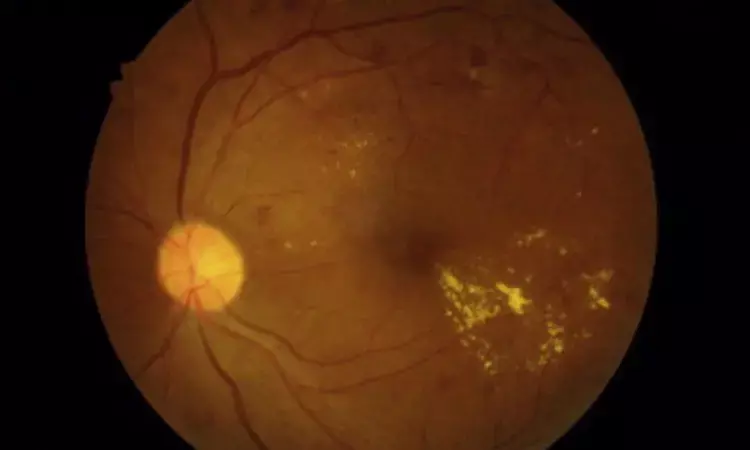- Home
- Medical news & Guidelines
- Anesthesiology
- Cardiology and CTVS
- Critical Care
- Dentistry
- Dermatology
- Diabetes and Endocrinology
- ENT
- Gastroenterology
- Medicine
- Nephrology
- Neurology
- Obstretics-Gynaecology
- Oncology
- Ophthalmology
- Orthopaedics
- Pediatrics-Neonatology
- Psychiatry
- Pulmonology
- Radiology
- Surgery
- Urology
- Laboratory Medicine
- Diet
- Nursing
- Paramedical
- Physiotherapy
- Health news
- Fact Check
- Bone Health Fact Check
- Brain Health Fact Check
- Cancer Related Fact Check
- Child Care Fact Check
- Dental and oral health fact check
- Diabetes and metabolic health fact check
- Diet and Nutrition Fact Check
- Eye and ENT Care Fact Check
- Fitness fact check
- Gut health fact check
- Heart health fact check
- Kidney health fact check
- Medical education fact check
- Men's health fact check
- Respiratory fact check
- Skin and hair care fact check
- Vaccine and Immunization fact check
- Women's health fact check
- AYUSH
- State News
- Andaman and Nicobar Islands
- Andhra Pradesh
- Arunachal Pradesh
- Assam
- Bihar
- Chandigarh
- Chattisgarh
- Dadra and Nagar Haveli
- Daman and Diu
- Delhi
- Goa
- Gujarat
- Haryana
- Himachal Pradesh
- Jammu & Kashmir
- Jharkhand
- Karnataka
- Kerala
- Ladakh
- Lakshadweep
- Madhya Pradesh
- Maharashtra
- Manipur
- Meghalaya
- Mizoram
- Nagaland
- Odisha
- Puducherry
- Punjab
- Rajasthan
- Sikkim
- Tamil Nadu
- Telangana
- Tripura
- Uttar Pradesh
- Uttrakhand
- West Bengal
- Medical Education
- Industry
Topical Anti-Inflammatory Drugs Promising in Managing Diabetic Macular Edema: Systematic Review Finds

Malta: A recent systematic review has evaluated the potential role of topical corticosteroids and nonsteroidal anti-inflammatory drugs (NSAIDs) in treating diabetic macular edema (DME) not associated with intraocular surgery. The findings, published in Diabetes Technology and Obesity Medicine, suggest that these topical agents may be an effective and safe therapeutic option for reducing central macular thickness (CMT) in select patients with DME.
"Although earlier case reports, series, and nonrandomized studies had indicated the potential role of topical anti-inflammatory therapy in DME, this review provides additional evidence reinforcing its possible clinical utility," the researchers wrote.
Diabetic macular edema remains a significant cause of vision loss in individuals with diabetes, often requiring invasive interventions such as intravitreal injections. However, the possibility of using less invasive treatments like topical eye drops is gaining attention due to their ease of administration and reduced systemic risk.
Against the above background, James Vassallo, Ophthalmology Department, Mater Dei Hospital, Msida, Malta, and colleagues aimed to evaluate whether the latest high-quality evidence justifies the use of topical anti-inflammatory agents in managing diabetic macular edema.
For this purpose, the researchers conducted a systematic review restricted to randomized controlled trials published from 2015 onwards. They searched MEDLINE, EMBASE, PubMed, Scopus, Web of Science Core Collection, and the Cochrane Central Register of Controlled Trials (CENTRAL) on October 11, 2024. The review included patients with diabetic macular edema who received topical corticosteroids or nonsteroidal anti-inflammatory drugs (NSAIDs). The primary outcome evaluated was the impact of these treatments on central macular thickness.
Key Findings:
- Seven of the eight included studies partially or fully supported the effectiveness of topical anti-inflammatory therapy in reducing macular thickness in diabetic macular edema.
- Significant heterogeneity was observed across the studies, which prevented a meta-analysis from being conducted.
- The overall quality of evidence from the included trials was considered moderate.
In the comprehensive review, the authors evaluated the current best evidence on using topical corticosteroids and NSAIDs for diabetic macular edema, highlighting their potential as a safe and effective strategy to reduce central macular thickness. While the findings support the possible role of topical anti-inflammatory agents in DME management, the authors emphasize the need for further large-scale, high-quality studies to determine optimal drug formulations, regimens, and patient selection criteria. They acknowledged limitations such as study heterogeneity, absence of a meta-analysis, and lack of PROSPERO registration due to a single reviewer.
The authors call for future research using advanced formulations with improved ocular penetration, along with investigations into adherence issues. If validated, topical therapy could be meaningfully integrated into existing treatment algorithms for DME.
Reference:
Vassallo J, Galea M. (2025) Efficacy of topical corticosteroids and nonsteroidal anti-inflammatory drugs for the treatment of diabetic macular edema not in the context of intra-ocular surgery: a systematic review, Diabetes Technology and Obesity Medicine 1:1, 18–30, DOI: 10.1089/dtom.2024.0005.
Dr Kamal Kant Kohli-MBBS, DTCD- a chest specialist with more than 30 years of practice and a flair for writing clinical articles, Dr Kamal Kant Kohli joined Medical Dialogues as a Chief Editor of Medical News. Besides writing articles, as an editor, he proofreads and verifies all the medical content published on Medical Dialogues including those coming from journals, studies,medical conferences,guidelines etc. Email: drkohli@medicaldialogues.in. Contact no. 011-43720751


